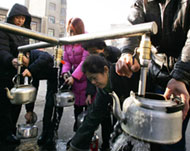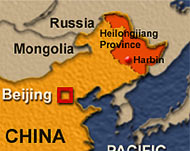Toxic slick reaches China city
An 80km-long slick of highly toxic chemicals has reached the Chinese town of Harbin after flowing down the Songhua river.

Authorities have shut off water supply to millions of residents in the capital of China’s northeastern Heilongjiang province for fear that the pollution could cause cancer.
The contaminated section of water, caused by a massive explosion at a PetroChina benzene factory in neighbouring Jilin province on 13 November, began entering Harbin at 3am (1500GMT) on Thursday, authorities said.
“It will take about 40 hours to pass,” Shi Zhongxin, director of the city’s water bureau, said on state television. “After it passes … we will have to make efforts to disinfect the water.” He did not give any details.
Benzene is a carcinogen that causes life-threatening cancers.
In the meantime, schools have been closed and bottled water is being trucked in from elsewhere in China. Harbin, a city of 3.8 million people, was also digging 100 new wells.
Panic
The decision to shut off water service on Tuesday set off panic buying of bottled water, soft drinks and milk, leaving supermarket shelves bare.
 |
|
Residents rushed to secure water |
Families filled bathtubs and buckets before taps ran dry.
Calm was restored by Thursday, with huge pallets holding dozens of bottles of water piled up in the city’s wholesale districts.
Authorities froze prices to prevent overcharging.
There were also reports that local residents were jamming the airport and railway stations trying to get out of the city.
China’s central government confirmed for the first time on Wednesday that the shutdown was a result of a “major water pollution incident” in the Songhua River after the chemical plant explosion that killed five people.
Apology
|
“We are deeply, deeply sorry” |
A senior Chinese official has issued a rare public apology the disaster, state media said Thursday.
“We are deeply, deeply sorry,” the Beijing News quoted Jiao Zhengzhong, vice governor of neighboring Jilin province as saying.
The message was apparently directed at the people and businesses of Heilongjiang province in the path of the slick.
A water-checking station found on 20 November that the chemicals’ benzene and nitrobenzene levels were far higher than state standards – with nitrobenzene at one point 103.6 times higher than normal, it said.
“Massive amounts can lead to the disorder of blood cells – in other words, leukemia,” Zhang Lanying, director of the Environment and Resources Institute at Jilin University, was quoted as saying.
Russia concerns
The explosion was blamed on human error in a tower that processed benzene, a toxic, flammable liquid.
In neighbouring Russia, news reports said concern was growing over the pollution threat in the border city of Khabarovsk, about 700km downriver from Harbin.
 |
|
There are concerns that a Russian |
China’s Foreign Ministry said in a statement that it had informed Russia of the case.
The disaster highlights the precarious state of China’s scarce water supplies.
The country is trying to meet competing demands from its 1.3 billion people and booming industry, while the government says major rivers are dangerously polluted.
With its huge population, China ranks among countries with the smallest water supplies per person. Hundreds of cities regularly suffer shortages of water for drinking or industry.
Protests
Protests have erupted in rural areas throughout China over complaints that pollution is ruining water supplies and damaging crops.
 |
|
Scores of residents jammed rail |
Protesters often accuse officials of failing to enforce environmental rules either in exchange for bribes or for fear of hurting local business.
“This is the tip of the iceberg,” said Elizabeth C Economy, director of Asia Studies at the Council on Foreign Relations in New York and author of the 2004 book The River Runs Black: The Environmental Challenge to China’s Future.
“We’ve seen over the past six months or so a number of factory-related protests … because factories don’t live up to or don’t enforce China’s own environmental regulations and laws,” she said.
“So if, in fact, this is a case of that happening, then this is part of a much broader, systemic problem.”
Harbin is one of the coldest places in China, with overnight temperatures this week of minus 12 degrees Celsius.